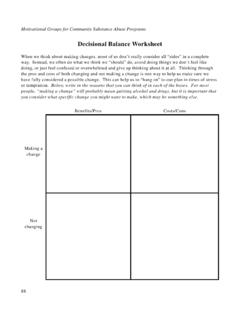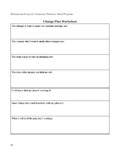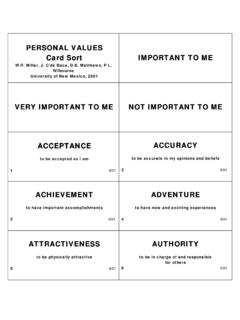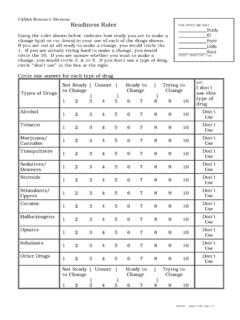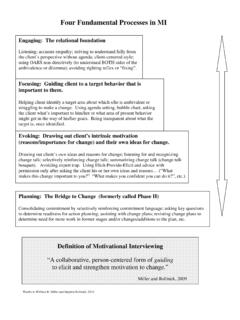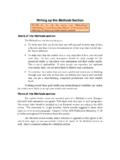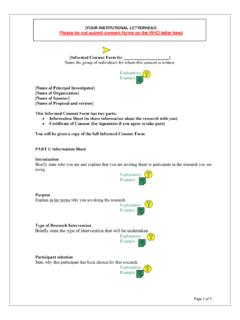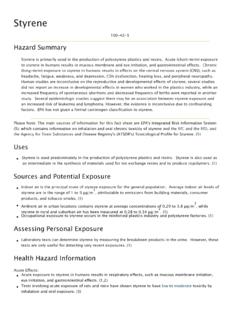Transcription of Teaching the Four Processes - Motivational interviewing
1 Teaching THE four PROCESSESMINT Pre Forum WorkshopBill Miller & Terri MoyersFort Wayne September 2012 EngagingFocusingEvokingPlanningRelationa l Motivational Foundation Interviewing1. Engaging2. Focusing3. Evoking4. PlanningThe Processes are somewhat linear .. Engaging necessarily comes first Focusing (identifying a change goal) is a prerequisite for Evoking Planning is logically a later stepEngage Shall we walk together?Focus Where?Evoke Why?PlanHow?.. and yet also recursive Engaging skills (and re engaging) continue throughout MI Focusing is not a one time event; re focusing is needed, and focus may change Evoking can begin very early Testing the water on planning may indicate a need for more of the above The four Processes are inter wovenPlanningEvokingFocusingEngagingFour Foundational ProcessesCan it be MI without.
2 Engaging? Focusing? Evoking? Planning?NoNoNoYesSo it becomes MI when .. 1. The communication style and spirit involve person centered, empathic listening (Engage)AND 2. There is a particular identified target for change that is the topic of conversation (Focus)AND 3. The interviewer is evoking the person s own motivations (or plans) for change (Evoke)Change is Broader than Behavior Decision to make a choice Forgiveness, Leaving or staying Attitude to become a different person To be more Compassionate, Assertive etc. Condition to address a complex problem Diabetes, depression, PTSD Resolution Acceptance Complicated grief Finding peace regarding a decision Tolerance for anxiety, uncertainty TO ENGAGEWhat do clinicians tell themselves that leads them away from MI?
3 Mental Shifts in Engaging Engaging is Task #1 Directing, Guiding and Following Resist the Righting Reflex, Directing, and Fact Gathering [Decrease MI inconsistent responses]Skills in Engaging OARS Replacing questions (fact gathering) with reflections Complexifying reflectionsMeasuring Engaging Global: Spirit (Collaboration and Autonomy Support) Clinician Behavior OARS Reflection/Question Ratio % Complex Reflections Client Working alliance RetentionHow To Teach OARS?LEARNING TO FOCUSM ental Shifts in Focusing Importanceof focusing clarifying one or more goals Balancing of expertise client s and clinician s Developing sharedgoals Negotiating the focus Three scenarios: Clear focus (proceed to evoking) Menu of options (agenda mapping) [Living with diabetes] Unclear focus (formulation)[The confused artist]4-Process coding sheetWhat are the focusing challenges where you work?
4 3-month prioritiesWhen there is a pre set focus: What if the client doesn t share it? Evoke! Dealing with coercion and dual roles What if you get no change talk at all? Develop discrepancy! [Original MET demo] How to do that? Develop a training exercise not MET or values card sortDecisional Balance? Pre decisional (ambivalent) people? Post decisional (action) people? No apparent ambivalence Running headstart (precontemplation) Equipoise No ? ? YesMeasuring Focusing Global: None so far. Clarity of goal by end of session? Clinician Behavior Unless the client or context immediately define the goal(s), there should be an observable process of discussing the possible objectives of consultation. Client Working alliance: Goal agreementLEARNING TO EVOKECan Counselors Evoke Change Talk?
5 Moyers, Martin, Houck, Christopher & Tonigan, 2009 Associational ++.069+++.022 .085++.074+++CT = Change TalkMICO = MI ConsistentMIIN = MI InconsistentCCT = counterchange talk (sustain and resist)MIIN = MI ++Can Counselors Evoke Change Talk?Glynn & Moyers (2010), Journal of Substance Abuse Treatment 39: 65 70 Experimental EvidenceCan Counselors Evoke Change Talk?Glynn & Moyers (2010), Journal of Substance Abuse Treatment 39: 65 70 9 counselors alternated (in 12 minute segments) between MI: Change talk evocation (CT) and FA: Functional analysis of drinking in conversations with 47 college students about drinking concerns Coded change talk (CT) and sustain talk (ST)% Change Talkand Sustain Talk and their Counselors Evoke Change Talk?
6 Moyers et al (in progress) Project ELICIT Training counselors in two different MI strategies: Plain or Pure MI(MI) Change Talk On Steroids MI(MI+) Frontline substance abuse providers in public agencies Work samples at baseline, post training, 3, 6, 12 months Does change talk in clients differ depending on what clinicians have been taught?Workshop Training(n=191)MI Standard (MI)N = 96MI with Change Talk Emphasis(MI Plus) n = 95 Coaching and Feedback StandardCoaching and Feedback Specific to Client Speech3, 6 and 12 month Follow UpPercent Change Talk in Client SessionsNIDA 021227 Project ElicitResults for post training time pointMI group n= 78, MI+ group n= 75No significant differences between groups in change talk Significant difference between groups in sustain talk HLM: = , p <.
7 05MI group mean = , SD = + group mean = , SD = Shifts in Evoking Evoke ( don t try to install) motivation Requires a focus (and engagement) Let go of assessment as a prerequisite Resistance = Sustain Talk + Discord (Interpersonal)What is Resistance ?Sustain TalkDiscord XSustain Talk and Discord Sustain Talk is about the target behavior I really don t want to stop smoking I have to have my pills to make it through the day Discord is about your relationship You can t make me quit You don t understand how hard it is for me Bothare highly responsive to counselor styleWhat is Discord? Behavior Interpersonal (It takes two to have discord) A signal of dissonance in your relationship Predictive of (non)changeSome Discord Signals Defensiveness Arguing Challenging Discounting Hostility Interrupting Talking over the counselor Ignoring Inattention Changing the subjectSkills in Evoking Recognizingchange talkHow to teach it?
8 PreparatoryChange TalkFour ExamplesDARN DESIRE to change (want, like, wish .. ) ABILITY to change (can, could .. ) REASONS to change (if .. then) NEED to change (need, have to, got to ..)MobilizingChange TalkReflects resolution of ambivalenceCATs COMMITMENT (intention, decision, promise) ACTIVATION (willing, ready, preparing) TAKING STEPSYet another metaphorMI HillContemplationPreparationAction(Pre-) CHANGE TALK AND SUSTAIN TALKO pposite Sides of a CoinExamples of Sustain TalkThe other side of ambivalence I really enjoy gambling(D) I don t think I can give it up (A) Gambling is how I have fun(R) I don t think I need to quit(N) I intend to keep on gambling (C) and nobody can stop me I m not ready to quit(A) I went back to the casino this week (T)Skills in Evoking Recognizingchange talkHow to teach it?
9 Embedded change talk Snatching Change Talk from the Jaws of Ambivalence Change talk often comes intertwined with sustain talk. That s the nature of Change Talk from the Jaws of Ambivalence I really don t want to stop smoking, but I know that I should. I ve tried before and it s really hard. 1. You really don t want to quit 2. It s pretty clear to you that you ought to quit. 3. You don t think you canquit See, the thing is, all my friends drink. Some of them probably drink way too much, too, but if I quit drinking, I don t have any friends. I just stay home. That would be pretty lonely. Quitting would cause a new problem for you. And at the same time you recognize that you, and probably some of your friends, are drinking way too much.
10 I know you re worried that I m getting addicted, and I guess I can see what you mean, but I really need more pain medicine. I don t know how I would get through the day without it. If you won t prescribe it, then I ll find someone else who will. You understand my worry about dependence. It s hard to imagine how you would get along without more medicine. One way or another, you re going to get more in Evoking Recognizingchange talk Embedded change talk Evokingchange talkThe Committed Smoker Evocation Coding Sheet Strategic thinkingWhat was she thinking? Evoking confidenceEvoking Confidence Evoking Client StrengthsEvoking Confidence: Speaker Topic: Something that you: would like to do have reason to do is important for you to do But also you are not sure whether: you cando it you have the ability to do it You have the time/energy to do it, Listen carefully with a goal of understanding the dilemma, but give no advice Ask these four open questions, and listen: On a scale from 0 to 10, how confident are you that you could make this change if you decided to?
